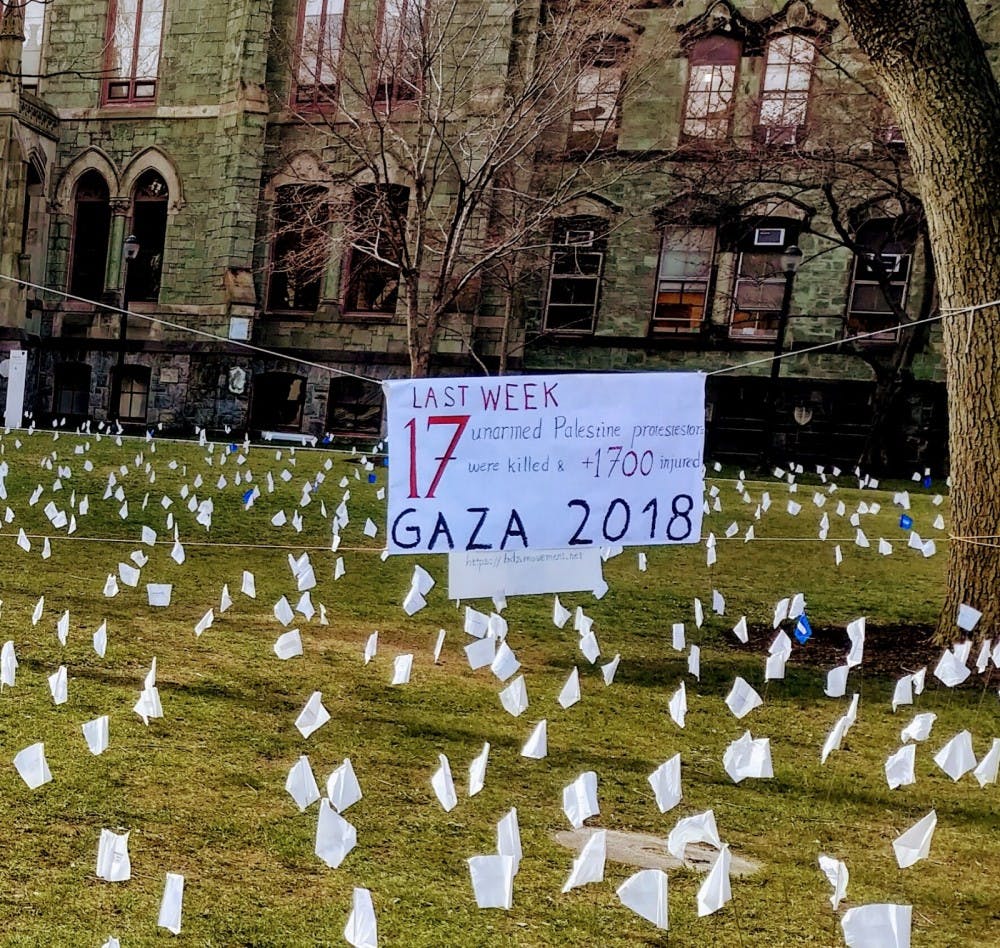Last week, Penn Students for Justice in Palestine held our annual Israeli Apartheid week in order to raise awareness for the system of Israeli laws and policies that marginalize Palestinians. A day before any Israeli Apartheid Week events took place, a guest column by College sophomore Ariela Stein was published in The Daily Pennsylvanian labeling our events as “lies and half-truths” and a cover for “masked anti-Semitism.” It also accuses SJP of intentionally scheduling our events during the Jewish holiday of Passover. These claims are misleading and unfounded. The dates for our events were chosen based on the availability of College Green for demonstrations, the availability of guest speakers, and because it coincided with Penn Political Coalition’s Policy Week (a group which we are a part of and required to host events for).
As an organization, SJP strongly condemns anti-Semitism. Our events critique Israeli policies, not Judaism or the Jewish community. As a state, Israel is open to the same critical lens as other nations, and as residents of the United States, the Israeli military’s largest financial supporter, we have a unique obligation to scrutinize its unjust policies.
Some are also troubled by our use of the term apartheid. To be clear, the label of apartheid has been applied to Israel’s policies by former Israeli politicians, human rights organizations, the United Nations and South African leaders like Desmond Tutu and Mandla Mandela. The African National Congress, South Africa’s ruling party, actively took part in this year’s Israeli Apartheid week. The real story isn’t about the timing or language behind our events, it’s about the apartheid policies that Palestinians are subject to.
For Palestinians in the occupied West Bank, the system of apartheid is enacted through a 50-year long military occupation and the Israeli-government-promoted practice of building illegal settlements (Jewish-only towns). Settlers and Palestinians live completely different lives, with separate road systems and legal systems. Settlers are tried in Israeli courts under Israeli civil law while Palestinians are tried in military tribunals under martial law-where the conviction rate is 99.74 percent. Over 100 military checkpoints severely restrict Palestinian movement, employment, and society in the West Bank. Our event last Tuesday sought to bring awareness to the “apartheid wall” erected between the West Bank and Israel, which allows further takeover of Palestinian land, as 85 percent of the wall does not lie along any internationally recognized borders.

Within Israel, 35 laws specifically allow for discrimination against non-Jewish and Palestinian citizens of Israel. For example, an Israeli citizenship law expressly bars Palestinian spouses of Israelis from living in Israel. The Law of Return gives any Jewish person the right to live in Israel but excludes 7 million Palestinian refugees from returning to their homes. Palestinian-Israeli citizens are withheld the same levels of access to utilities, schools, building permits and other crucial social services. In 2016, the Israeli government voted against a proposal to include equality into Israel’s Basic Law .
For Palestinians in Gaza, apartheid takes the form of a crippling siege that is now entering its 11th year. Israel maintains exclusive control of Gaza’s airspace, and territorial waters and imposes a full blockade by air and sea. By land, Israel controls the flow of water, food, electricity, medicine, construction supplies, people, and imports/exports into the region. Because of these restrictive policies, Gaza has been described by the U.N. as “an open air prison.” Four out of five residents depend on foreign aid, and half are unemployed. U.N. reports conclude that by 2020, Gaza will be uninhabitable. Israel, despite its legal responsibilities as an occupying power, has done little to address the ongoing humanitarian crisis. This is the backdrop for recent protests.
Over the past two weeks, 30,000 Palestinian protesters took part in the Great Return March and marched towards the Israel-Gaza border. They are protesting the Israeli blockade and for the right of Palestinian refugees to return to their villages after the forcible Israeli expulsions of 1948 and 1967. The vast majority of protesters demonstrated peacefully. A few were armed with stones and Molotov cocktails. Israeli forces were armed with tanks, tear gas, and snipers. In advance of the protest, over 100 snipers were deployed to the border and given authorization to use live ammunition. So far 31 Palestinians have been killed, including children and marked journalists wearing Press vests. Over 1,000 have been injured from gunshot wounds, tear gas, and tank shells. Zero Israeli soldiers were injured or killed. The next day the Israeli Defense Forces, in a now deleted tweet, said that “Nothing was carried out uncontrolled, everything was accurate and measured, and we know where every bullet landed.” The protests are set to continue today. This current wave of violence is why SJP hosted a Gaza memorial on College Green last Thursday.
Through examination of Israeli policies in these contexts, it’s clear that the legal definition of apartheid, as set by the Rome Statute, is met: inhumane acts such as murder, forcible transfer, imprisonment, or persecution of an identifiable group on racial, national, ethnic, cultural, religious, or other grounds, "committed in the context of an institutionalized regime of systematic oppression and domination.” To quote Desmond Tutu, “If you are neutral in situations of injustice, you have chosen the side of the oppressor.”
AJJIT NARAYANAN is a College junior studying in urban studies and economics. He is the co-chair of Penn Students for Justice in Palestine. His email address is ajjit@wharton.upenn.edu.



